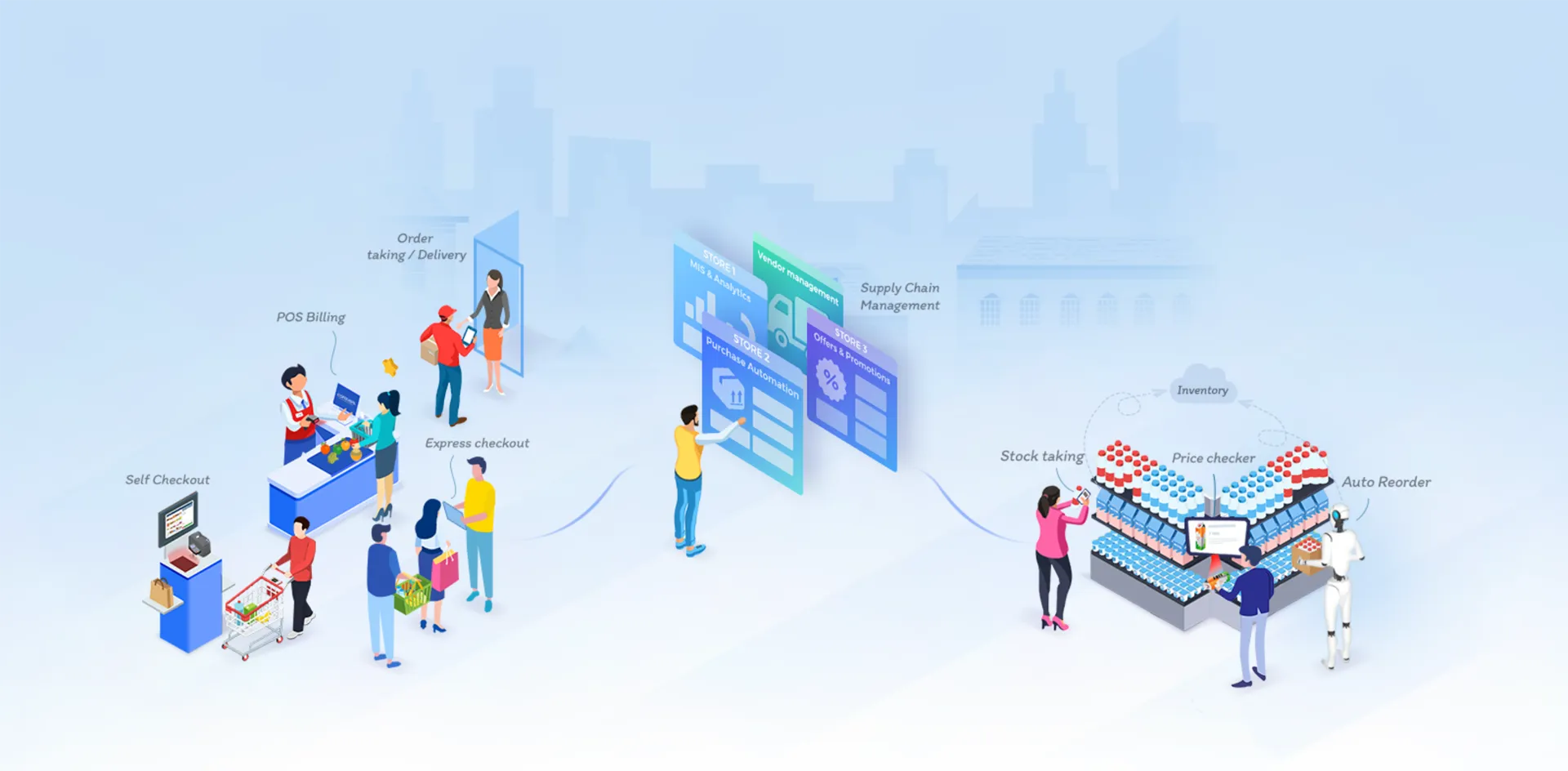Definition of an ERP system
ERP solution stands for Enterprise resource planning. ERP tool is a software widely used by organizations to manage day-to-day business activities, including accounting, procurement, project management, risk management, compliance management, supply chain operations, ordering, delivery, and reporting. A robust ERP application integrates all the core functions into a unified system that helps plan, budget, execute, predict and report on an organization’s results.
History of ERP platform

Why do businesses need an ERP system?
Having an individual system to manage each critical function results in a huge burden, time consumption, poor collaboration, inefficiency, and improper decision-making. Businesses need an ERP solution that can bind all the functions into a single software to help them connect and collaborate with their employees, manage their everyday functions, and make data-driven decisions with the help of technology. ERP tool makes every business process streamlined and easier to track. Using an ERP platform also helps in improving the overall efficiency, productivity, and accuracy of every critical business process.
Download ERP software for free
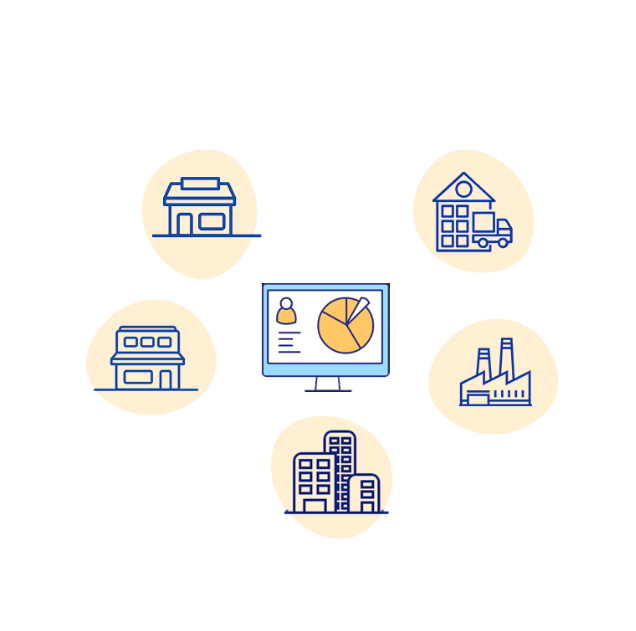
How does an ERP software work?
Using the ERP tool, information about any operation performed by one department renders visibility to the other departments and authorized employees of the organization, which can be utilized across the ERP platform. ERP application collects such consolidated information from all its integrated functions and gives a comprehensive understanding of the business performance through various insightful dashboards and reports making it easier for businesses to make real-time decisions in optimizing the costs and streamlining the processes.
Schedule ERP software demoKey features of an ERP system

Integrating different functions of business
Integrated ERP software solution allows all the functions or modules to work together and empower businesses to have a bird's eye view of your business. Easy access to information results in faster decision-making and lean operations team. Everything is easier and quicker.
Inventory management
ERP software helps you manage optimum inventory levels by automating the inventory management process. The right ERP application with a built-in reporting system helps you to forecast stock movements and know the insights on the stock trends, gaps, low-yielding products, etc.
Security
ERP software security shields business data and hinders theft, pilferage, and inventory shrinkage with complete security management software. With database security, access control, and user management, business security is enhanced.
Cloud-solutions
A Cloud ERP helps reduce overhead costs and streamlines processes for easier accessibility and mobility. Cloud ERP also helps you access data on the go, provides greater conveniences, and offers scalability and lesser capital investment.
Cost control and analysis
ERP software helps you track the cost incurred at different projects, units, departments, etc., and allows you to set the budget using which one can track variances. The insights from ERP application help you cut down the cost of unprofitable areas and ones that need to be optimized.
Billing management
Invoicing and Billing are critical for smooth functioning and are the primary source of cash flow for businesses. The right ERP should help you adhere to statutory compliance based on the demands of your country's latest rules and regulations.
CRM
CRM in ERP software helps you identify potential customers, prioritize special customers to make them feel unique, keep in touch with them using SMS, and track your customers' journey. CRM improves business performance through faster sales checkouts and spending efficiently on promotions knowing what your customers like and don't like.
Insightful reports
With real time reporting in the ERP system, it is possible to have the most up-to-date information at your fingertips. Based on reports generated from every function, you can make timely decisions and plan the way forward. When you have the scheduled reports function in your ERP, you can get the required reports delivered to your inbox regularly.
Accounting and Finance management
With inbuilt automation and powerful capabilities, robust ERP platform helps manage accounting and finance needs efficiently. From billing to critical accounts, processes such as accounts receivables, accounts payables, recording and tracking cash flow and the taxes involved, approving transactions, and taking decisions on the go can be done easily.
Purchase and Sales management
Purchase management and Sales management is an important aspect of any business. ERP platform offers the best in increasing process efficiency by streamlining the order management system right from order-to-invoice-to-cash. With complete tracking ability, ERP solution simplifies the procurement process of stock and other supplies.

Cost savings
Save tons of money by automating the simple tasks and minimizing the resources.

Scalability
Strengthen and scale your infrastructure to account for the business expansion.

100% accuracy
Eliminate the errors and act on the precise data acquired from all the functions seamlessly.

Improved productivity
Enjoy better work force productivity and increased output with easier access to information.

Increased efficiency
Drive maximum efficiency by allowing the users to collaborate effectively across multiple functions.

High security
Facilitate encrypted communication and strongly secured user authentication.

Enhanced agility
Identify and react to the new opportunities quickly with complete access to real-time business data.

Assisted decision making
Make assisted and confident business decisions based on the invaluable insights, graphs and comparisons provided by the smart reports.
Types of ERP application based on industry
A Retail ERP Software is an all-in-one software that helps manage all the business operations from POS or billing, ordering, inventory, purchase and supply chain management, accounting, CRM and loyalty, analytics, BI/reports, security etc seamlessly from POS billing to balance sheet.
One of the biggest benefits of using Retail ERP software is having accurate, real-time information of all operations like sales, purchases, and inventory to make faster business decisions. A Retail ERP application helps to get 100% control on inventory thus reducing stock-outs, pilferage, wastage, and driving more sales. With integrated accounting, businesses can track and manage all their payments from one place. A Retail ERP application also helps to quickly assess the changing consumer needs and integrate new channels easily
Learn more about Retail ERP software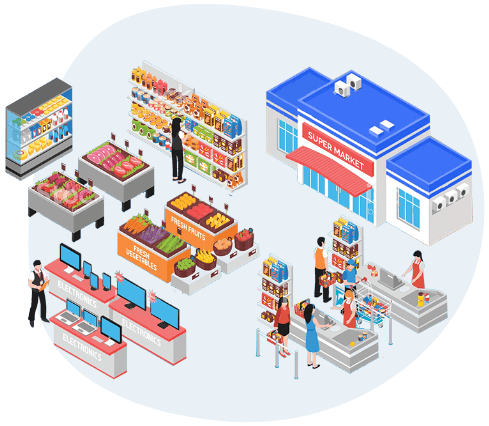
A Restaurant ERP software helps automate end-to-end management of overall restaurant operations including inventory management, KOT, billing, bookkeeping, report generation, mobile-order capabilities, recipe management, and much more.
Restaurant ERP software helps to increase productivity and allows restaurant staff to manage their operations seamlessly with very little effort and skill using mobile solutions integrated into ERP program for order taking, fulfilling the orders, reconciliation of sales channel-wise, and capturing the feedback from the customers. With the ERP tool, Restaurant owners can control the operations of one or multiple outlets with ease, integrate with online marketplaces, manage both offline and online payments in one place, track the business performance on the go and make better decisions.
Learn more about Restaurant ERP Software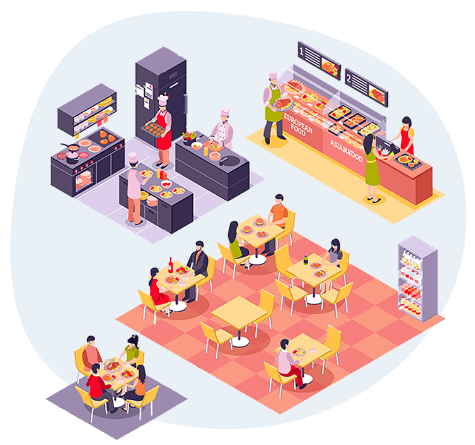
A Distribution ERP software is designed for stockists, super-stockists, wholesalers, dealers and distributors to manage the down-stream supply chain effectively. Distributors place bulk orders with manufacturers and sell them in smaller quantities to retailers or end consumers.
With ERP solution, Distributors can track inventory across multiple warehouses, handle returns management, flexibility, have control over price, protect margin on different offers/schemes and fulfill the orders with effective sales collection, route, and rep-management. With ERP solution, distributors can manage multiple warehouses efficiently, reduce reverse logistics costs, rotate inventory fast, sell on the go, plan and monitor production so that orders planned can be fulfilled effectively.
Learn more about Distribution ERP system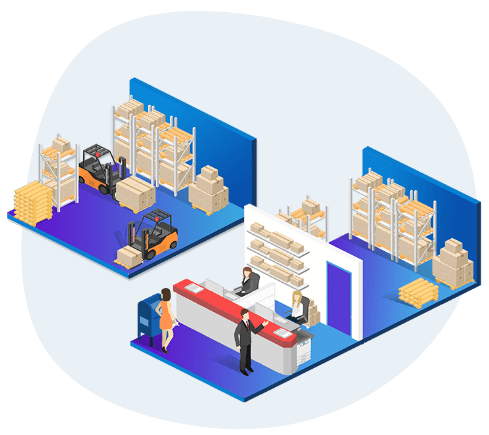
Types of ERP based on industry
- ERP for Retail
- ERP for Restaurant
- ERP for Distribution
A Retail ERP Software is an all-in-one software that helps manage all the business operations from POS or billing, ordering, inventory, purchase and supply chain management, accounting, CRM and loyalty, analytics, BI/reports, security etc seamlessly from POS billing to balance sheet. One of the biggest benefits of using Retail ERP software is having accurate, real-time information of all operations like sales, purchases, and inventory to make faster business decisions. A Retail ERP application helps to get 100% control on inventory thus reducing stock-outs, pilferage, wastage, and driving more sales. With integrated accounting, businesses can track and manage all their payments from one place. A Retail ERP application also helps to quickly assess the changing consumer needs and integrate new channels easily

A Restaurant ERP software helps automate end-to-end management of overall restaurant operations including inventory management, KOT, billing, bookkeeping, report generation, mobile-order capabilities, recipe management, and much more. Restaurant ERP software helps to increase productivity and allows restaurant staff to manage their operations seamlessly with very little effort and skill using mobile solutions integrated into ERP program for order taking, fulfilling the orders, reconciliation of sales channel-wise, and capturing the feedback from the customers. With the ERP tool, Restaurant owners can control the operations of one or multiple outlets with ease, integrate with online marketplaces, manage both offline and online payments in one place, track the business performance on the go and make better decisions.

A Distribution ERP software is designed for stockists, super-stockists, wholesalers, dealers and distributors to manage the down-stream supply chain effectively. Distributors place bulk orders with manufacturers and sell them in smaller quantities to retailers or end consumers. With ERP solution, Distributors can track inventory across multiple warehouses, handle returns management, flexibility, have control over price, protect margin on different offers/schemes and fulfill the orders with effective sales collection, route, and rep-management. With ERP solution, distributors can manage multiple warehouses efficiently, reduce reverse logistics costs, rotate inventory fast, sell on the go, plan and monitor production so that orders planned can be fulfilled effectively.

What does an ERP solution consist of?
Purchase management
Ensures tracking of every inward stock that enters a business, fixes the right pricing for the stock, and initiates re-order suggestions based on sales
Warehouse management
Gain complete control over the daily warehouse operations from reordering, receiving, put-away, storage, picking, packing, and shipping
Inventory management
Streamline all the inventory operations from procurement to sales with real-time tracking and gain control across outlets for efficient management
CRM and Loyalty
Manage different types of loyalty programs in your store and encourage your customers to buy more, resulting in increased sales
Billing management
Bill from any device to provide super-fast checkouts that delight your customers and give them a reason to visit your store more often
Omni-channel management
Customer order management for improved order fulfillment and to offer superior customer experience
Delivery management
Perform home deliveries to your customers in a smarter way with minimal cost, skills, and least workforce
Mobility solutions
Bring speed in business, ensure accurate information and real-time visibility into business processes with ERP mobility
Security management
Shield your business data and hinder thefts, pilferage and inventory shrinkage with complete security management software
Reporting
POS BI reports give real-time insights into buying the right product, the right quantity, the right price, the right time
Accounting and Finance management
Take insight-driven decisions using detailed financial reports of your business by adopting financial accounting ERP tool
Third-party integrations
Collaborate with powerful and intelligent third-party solutions, gain immediate competitive advantage and untap long-term benefits
Types of ERP systems based on business size
ERP System for
Small Business
ERP software helps small business owners to transition from traditional operations associated with paper and spreadsheets to automated, streamlined, and efficient operations in all business aspects. Small businesses need to evaluate and choose the lower version of ERP solution with necessary modules and features and later scale the ERP solution as their business grows.

ERP System for
Midsize-business
In general, midsize companies require an ERP program with business driving modules that will help them reach the aimed growth in the market. Operations such as sales, Customer Relationship Management (CRM) and Loyalty, integration with marketplaces, and financial operations act crucial in competing and helping them to scale the business

ERP System for
Enterprise
Large businesses must opt for robust ERP system software that holds all functions of their business, to sustain and establish themselves better in the competitive enterprise market, streamline their rapid everyday operations and continuously improve the processes, practices, and tools. An enterprise ERP software includes seamless integration across multiple outlets, intelligent automation, insightful analytics, the ability to handle large data, and AI-driven mobility solutions that make businesses leap.

Types of ERP system based on Platform
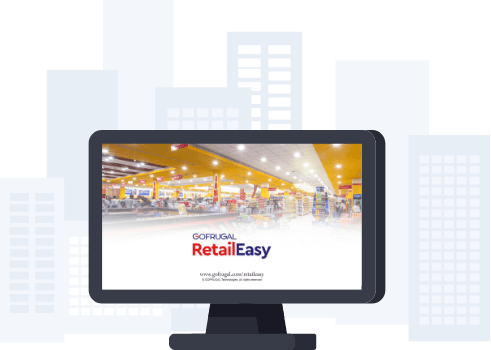
On-premise ERP solution
With an On-premise ERP solution, the Enterprise Resource Planning software will be implemented in-house and maintained in a physical office space thus cannot be accessed without the internet and outside the office space. Businesses enjoy full control and ownership of the version with the upfront investment in ERP solutions. They do not necessarily require the internet to run operations seamlessly.
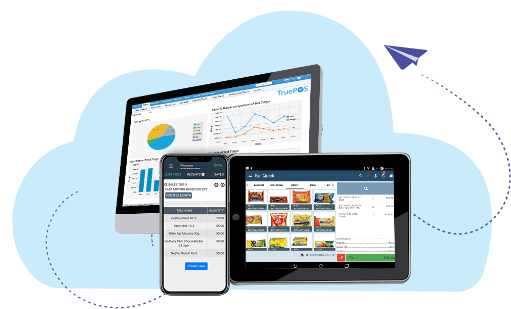
Cloud-based ERP solution
With a Cloud-based ERP solution, entire business data is stored in the cloud and businesses can monitor all the operations from anywhere, at, and on any device. By using the Cloud ERP program, the up-front costs are reduced. As the software development moves into CI-CD (continuous integration, continuous deployment) model, a cloud-based ERP platform can help to manage the frequent updates better ensuring zero downtime and faster roll-out of features that are required to stay ahead in the market. Cloud-based ERP system provides centralized deployment ensuring that all the data remains on the cloud and activity of users with the data can be easily monitored and controlled, without worrying about security.
Reasons to adopt a Cloud ERP platform

Capital savings
Reduced capital as there is minimal hardware expenditure.

Better scalability
Easier to switch to advanced features instantly as you scale.

Faster upgrade
Automatic update process eliminating the effort and technical issues.

More flexible
Convenient to access anytime/anywhere and from any device.
How to choose an ERP system?

Evaluate your business needs and goals
Evaluate
Plan
Plan your budget and ROI
Consider the solution-fit, scalability, deployment options and mobility solutions
Consider
Choose
Choose the one that delights your business, employees and customers
Why choose Gofrugal's ERP application?
Going forward businesses need a smart collaborative platform with integrations to different marketplaces, e-commerce, online and mobile ordering, loyalty providers, business intelligence systems, and other aggregators like digital wallets, suppliers, service providers, banks, and such regulatory authorities. Gofrugal's ERP application paves the way for such connected retail, restaurant, and distribution solutions.

ERP made easy
Simplifies business processes and provides freedom of choice to choose the device they want to operate
Minimal staff
Reduces cycle time and data entry requirements across the value chain
Least skills
Easy to learn as it does require any educational qualifications or expertise from the users
Accurate and reliable solution
Increases the accuracy and timeliness of information leading to better decision making
Transformation is made simple and in small steps
Makes it flexible to address changing business needs in an agile manner
Smart brands chose Gofrugal's smart ERP solution
Gofrugal software is a complete solution for the Retail / Electronics business.
Reports, Easy Billing process, Integrations process, In terms of accounting works, E-invoice, Market Needs.
GoFrugal - Restaurant Order Taking and Billing Software.
Functionally it has almost everything a restaurant would need to undertake its operations, stock, accounting, CRM & Kitchen Management.
Excellent Product and Support.
I am using the software for more than 10 years and it is very useful for billing and accounts with GST upload. Very much useful for finding the purchase order and make use to place order.
Nice.
Reports and billing easy access for lower qualification people.
Very good software.
Ease to use and understand as well as user friendly.
Covers all the requirement.
Reporting, Mobile Dashboard, user-friendly, it covers all the required features.
Good software.
Easy to use, more functionality, good software compared with others.
Great service.
Easy installation and great support and Easy to use.
The front runner.
Easy to use, understanding the application and 15 years of addiction.
Gofrugal software is a complete solution for the Retail/Electronics business.
Reports, Easy Billing process, Integrations process, In terms of accounting works, E-invoice, Market Needs.
Mr. Asheesh Tiwari
Unicorn Infosolutions Pvt Ltd
Retail ERP systemVery good software.
Ease to use and understand as well as user friendly.
Mr. Naveen Kumar
Sree Gupta Bhavan Pvt.Ltd.
Restaurant ERP systemThe front runner.
Easy to use, understanding the application and 15 years of addiction.
Mr. Sureshkumar Rathinam
Suresh Pharma
Distribution ERP systemNice.
Reports and billing easy access for lower qualification people.
Mr. Suresh Babu
REGAL SHOEZ
Retail ERP systemGoFrugal - Restaurant Order Taking and Billing Software.
Functionally it has almost everything a restaurant would need to undertake its operations, stock, accounting, CRM & Kitchen Management.
Mr. Manu Joseph
Inceptio Foods & Hotel India LLP
Restaurant ERP systemCovers all the requirement.
Reporting, Mobile Dashboard, user-friendly, it covers all the required features
Mr. Bheem rao
Patil Pharmacy
Distribution ERP systemGood software.
Easy to use, more functionality, good software compared with others
Dr.Krishna Das
Gokulam Ayurveda Health Care
Retail ERP systemGreat service.
Easy installation and great support and Easy to use
Mr. Sathya Narayanan
Ruci
Restaurant ERP systemExcellent Product and Support.
I am using the software for more than 10 years and it is very useful for billing and accounts with GST upload. Very much useful for finding the purchase order and make use to place order.
Mr. Aaditya kothari
